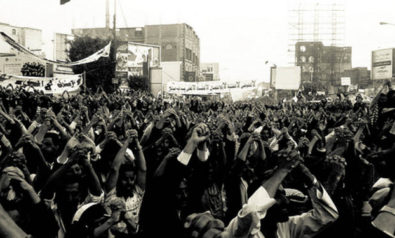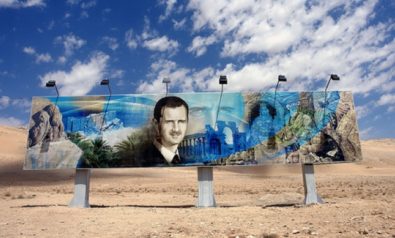Commentary on the visit of Lebanese Patriarch, Bechara Rai to the United States, and the growing role of religion in the Arab Spring.
The upcoming visit to the U.S. by Patriarch Bechara Rai, the new Lebanese head of the Maronite church, is attracting significant attention. The controversy surrounding his remarks on the Syrian uprising, the cancelation of his stop in Washington, and the criticism he is receiving from some in the Lebanese-American community has stirred a debate on the Arab Spring, the future of Christians in the Levant, and the role of the Obama administration.
Rai will be landing in St. Louis, Missouri on Tuesday. His twenty-day visit will take him to Chicago, New York, L.A., Cleveland, Houston, and other cities with significant Maronite presence, which is estimated to be approximately one million people in the United States. The newly-elected Patriarch has revised his itinerary and canceled a stop in Washington that had previously included a reception at the Lebanese embassy, as well as a meeting with the community at the “Lady of Lebanon” church. The abrupt cancelation was not for pastoral but political reasons, after the Patriarch failed to receive a meeting with US President Barack Obama.
The Controversy
The controversy began during Rai’s visit to France two weeks ago, when he warned that “regime change in Syria and the emergence of a Sunni regime will lead to an alliance between them and the Sunni brotherhood in Lebanon”. The Patriarch who was elected as the head of his church on the first day of the Syrian uprising on March 15, called Syrian President Bashar Assad an “open minded” person who “has studied in Europe”, adding that he “has taken some reforms” and “should be given time” by the international community. He also cautioned in an interview with France 24, warning of a “genocide and sectarian war” in Syria. The uprising there has thus far resulted in more than 2200 deaths, as well as the displacement and arrest of thousands of Syrians.
While Rai and Christians across the Middle East have valid concerns over events following the Arab Spring, such as attacks against the Coptic Church in Egypt (Christians are estimated to represent between 8 and 16 percent of the Egyptian population), or radical Islamists vandalizing movie theatres and pubs in Tunisia, the Patriarch’s defense of Assad has raised many eyebrows. U.S. Secretary of State Hillary Clinton warned recently of growing religious intolerance as a downside to the Arab Spring, remarking that "People have been killed by their own neighbors because of their ethnicity or faith,” during the release of the State Department's annual International Religious Freedom Report two weeks ago.
The Vatican and major churches in the Middle East have voiced anxiety over the Arab Spring and the future of the Christian minority in Syria (estimated to be between 5 and 10 percent of the population) and across the Levant, but no one outside Syria has offered public support for the embattled President or targeted criticism along sectarian lines.
Lebanese Context
Rai’s comments strike a familiar historic narrative with the Maronite community, whose ancestors were persecuted in Syria and Lebanon during the Ottoman Empire. Modern day Lebanon, which contains the largest percentage of Christians in the Arab world (estimated to be between 34 and 41 percent of the population), remains divided between two opposing camps. One supports the Shia group Hezbollah as well as Iran (which welcomed Rai’s stance), while the other sides with the Arab states and Western nations that have rejected his views.
Since he assumed the Patriarchy, one of Rai’s initiatives has been to launch dialogue between the various Lebanese Christian groups in order to find middle ground that would ease divisions on domestic and regional policies. However, his recent statements have created the perception that he only contributes to this schism, which will make it make it more difficult for him to head a credible and meaningful process.
Reaction in Washington
The officials within the Obama administration have been disappointed by the comments, as the US still looks to maintain strong ties with the Maronite church. A senior US official was quoted as saying that the Patriarch’s comments are “reckless and unjustified” to the Lebanese newspaper An-Nahar, while also stating that they will hurt Rai’s “reputation and stature.” The comments drew a sharp contrast with the U.S. policy on Syria, which called for Assad to step down in order to create steps for an orderly transition.
Washington had strengthened its ties to the Maronite church after the Cedar revolution in 2005, and former President George W. Bush hosted Rai’s predecessor, Cardinal Nasrallah Botrous Sfeir, on more than one occasion. Unlike Sfeir, however, Rai has not yet established the same clout inside and outside of Lebanon. In addition, unlike Bush, President Obama has not opened many doors to local Lebanese leaders, and has thus far pursued a more limited engagement with the country, possibly because the current U.S. priority in the region is focused on countries that are directly part of the Arab Spring.
Rai’s positions have also generated uproar within the Lebanese diaspora, whose overwhelming majority is Christian and is mostly dominated by groups critical of the Assad regime. Many Lebanese-American organizations voiced their dissatisfaction with Rai in statements and meetings with the U.S. government, while others, including Secretary of Transportation Ray Lahood, continued attempting to bridge the gap and arrange a meeting with Obama.
Contrary to the Patriarch’s expectations, the meeting with Obama was never confirmed. In addition, reports now indicate that Rai will not even meet with any US officials during his tour. Nevertheless, it is essential that Washington takes a more aggressive tone on the issue of protecting minorities in the Middle East as the region undergoes the tectonic political changes. It is noteworthy that in his 2009 Cairo speech, President Obama directly mentioned the Maronites of Lebanon while emphasizing that “The richness of religious diversity must be upheld – whether it is for Maronites in Lebanon or the Copts in Egypt."
A stop for Rai in Washington would have offered a constructive opportunity for both sides to explain their differences and give assurances to work through the issues. An inclusive transitional democratic process in Syria and other countries undergoing revolt remains the best shield for Arab minorities. It is also perhaps the only immunity against the religious intolerance that Ms Clinton described as “trading one form of repression for another.”
Support Fair Observer
We rely on your support for our independence, diversity and quality.
For more than 10 years, Fair Observer has been free, fair and independent. No billionaire owns us, no advertisers control us. We are a reader-supported nonprofit. Unlike many other publications, we keep our content free for readers regardless of where they live or whether they can afford to pay. We have no paywalls and no ads.
In the post-truth era of fake news, echo chambers and filter bubbles, we publish a plurality of perspectives from around the world. Anyone can publish with us, but everyone goes through a rigorous editorial process. So, you get fact-checked, well-reasoned content instead of noise.
We publish 2,500+ voices from 90+ countries. We also conduct education and training programs
on subjects ranging from digital media and journalism to writing and critical thinking. This
doesn’t come cheap. Servers, editors, trainers and web developers cost
money.
Please consider supporting us on a regular basis as a recurring donor or a
sustaining member.
Will you support FO’s journalism?
We rely on your support for our independence, diversity and quality.











Comment